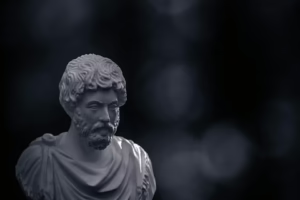The Absurd: Understanding Life’s Illogical Nature Through Camus
Introduction
The concept of the Absurd has intrigued philosophers and thinkers for centuries. It grapples with the inherent contradictions present in human existence, specifically the struggle to find meaning in a universe that appears indifferent to our desires for significance. Albert Camus, a French philosopher and author, is one of the most prominent figures in this discourse. His works, including The Myth of Sisyphus, shed light on the Absurd condition of humankind and offer poignant insights into navigating life’s inherent illogicality. This article delves into Camus’s perspective on the Absurd and its implications for understanding our lives.
Defining the Absurd
At its core, the Absurd arises from the conflict between humanity’s quest for meaning and the universe’s silence. Camus famously stated, “The absurd is born out of this confrontation between the human need and the unreasonable silence of the world.”[1] This contradiction can lead to feelings of frustration, despair, and sometimes even rebellion. To better grasp this concept, we can explore its relationship with existentialism, particularly how it diverges from traditional existential thought.
Camus vs. Existentialism
While existentialism, espoused by philosophers like Jean-Paul Sartre, suggests that individuals create their own meaning amidst a chaotic world, Camus posits that the search for meaning might be inherently flawed. In the face of the Absurd, he argues for acceptance rather than despair. While both philosophies acknowledge life’s inherent lack of meaning, Camus emphasizes the necessity of recognizing and confronting this reality.
The Myth of Sisyphus
Camus’s The Myth of Sisyphus is pivotal to understanding his philosophy of the Absurd. In this essay, Camus uses the mythological figure of Sisyphus—a man condemned to roll a boulder up a hill only for it to roll back down repeatedly—as a metaphor for the human condition. Sisyphus’s plight is eternally repetitive and seemingly futile, yet Camus suggests that acceptance of this absurdity allows for a more profound sense of freedom.
Sisyphus as a Symbol
Sisyphus represents the quintessential human struggle. His eternal labor echoes our own efforts to find meaning in a seemingly indifferent universe. Camus concludes that we must imagine Sisyphus happy, embracing his fate and finding joy in the struggle itself. This notion challenges us to find fulfillment and purpose in our lives, even amid futility. The act of pushing the boulder becomes a symbol of resilience, illustrating that meaning can be derived from the very act of living, despite its inherent absurdity.
Embracing the Absurd: Revolt and Freedom
One of the fundamental tenets of Camus’s philosophy is the concept of revolt. Rather than succumbing to despair or nihilism in the face of the Absurd, Camus advocates for a form of rebellion. This revolt involves recognizing and accepting life’s lack of inherent meaning while still choosing to live fully and authentically.
The Philosophy of Revolt
In his view, the act of revolt is not merely a passive acceptance but an active engagement with life. By acknowledging the Absurd, individuals can reclaim their freedom. Camus writes, “Revolt is the certainty of a crushing truth; it is the refusal to be a slave.”[2] In this context, embracing the Absurd empowers individuals to seize their existence, make choices, and create their own meanings. This perspective emphasizes personal responsibility and the importance of individual agency in a world that may not provide clear answers.
The Absurd Hero
Camus introduces the concept of the "Absurd Hero" as someone who, like Sisyphus, confronts the Absurd with courage and perseverance. The Absurd Hero embraces their struggle and understands that life’s search for meaning is itself a vital aspect of existence. This idea champions the human spirit—a recognition that, despite the chaos and uncertainty, we can strive for authenticity.
Examples of Absurd Heroes
Various characters in literature and real life embody the essence of the Absurd Hero. For instance, explore Meursault, the protagonist in Camus’s novel The Stranger. Meursault’s indifference and detachment from societal norms exemplify an acceptance of life’s inherent absurdity. By living authentically—not adhering to societal expectations—he showcases the possibility of finding meaning in the confrontation with the Absurd.
Similarly, the philosopher Friedrich Nietzsche’s concept of the "Übermensch" resonates with Camus’s idea of the Absurd Hero. Nietzsche advocates the creation of one’s values and embracing life beyond traditional moral constraints. Both thinkers offer pathways to navigate the Absurd, albeit from different philosophical angles.
The Importance of Personal Meaning
In a world characterized by absurdity, the onus of creating meaning and purpose falls upon the individual. Acknowledging life’s inherent lack of meaning can initially evoke feelings of despair, but as Camus highlights, it can also liberate us. When individuals recognize that they are responsible for their own meanings, they can begin to cultivate personal values and identities.
Creating Value Amidst Absurdity
While the universe may seem indifferent, individuals can actively construct meaning in their lives. Camus encourages readers to find joy in the simplest of experiences—love, friendship, art, and nature—with the understanding that these moments hold significance in their own right. This approach fosters a sense of connection and satisfaction, even against the backdrop of a seemingly uncaring cosmos.
The Role of Art and Creation
Art and creative expression can be transformative tools in our pursuit of meaning. For Camus, the act of creation serves as a rebellion against the Absurd, an assertion of human agency. Whether through literature, music, or any form of artistic expression, individuals can channel their experiences, emotions, and desires into something meaningful.
The creation of art becomes an acknowledgment of the Absurd and a way to transcend it. Much like Sisyphus pushing his boulder, the artist finds purpose and fulfillment in the act of creation itself—transforming ephemeral experiences into lasting works that resonate with others.
Confronting Despair: The Absurd and Nihilism
One of the greatest challenges in grappling with the Absurd is the risk of descending into nihilism—the belief that life is meaningless and that no values or goals are worth pursuing. Camus argues against this perspective, emphasizing that while life may lack intrinsic meaning, it does not mean that we should resign ourselves to despair.
Navigating the Fine Line
Understanding the Absurd allows us to navigate the thin line between existential despair and embracing life’s uncertainty. While nihilism can arise from an encounter with the Absurd, Camus insists that there is a more constructive response. The key lies in resilience and the ability to forge one’s own path amidst the chaos.
Finding Joy Beyond Despair
One of the essential teachings from Camus is that joy and fulfillment can coexist with an awareness of life’s absurdity. Acknowledging the realities of existence can deepen our appreciation for moments of happiness. By recognizing the transient nature of life, individuals can cultivate a richer experience, finding beauty in the fleeting and the ordinary.
Ethics Beyond the Absurd
Camus’s philosophy of the Absurd also raises questions about ethics and morality. If traditional systems of meaning are unraveled, how do we navigate ethical decisions? In the absence of an inherent moral framework, Camus advocates for a personal ethics grounded in empathy and human solidarity.
Solidarity and the Absurd
Camus believes that our shared experience of the Absurd can foster solidarity among individuals. Recognizing that others also grapple with the same challenge can create a sense of connection and community. This compassion becomes essential in navigating life’s complexities, reinforcing the idea that while meaning may be personal, we are not alone in our struggles.
Conclusion
The Absurd, as articulated by Albert Camus, offers invaluable insights into understanding life’s illogical nature. By accepting the tension between our need for meaning and the universe’s indifference, we can navigate the chaos of existence with resilience and authenticity. The journey of reconciling with the Absurd is both a challenge and a liberation—a call to embrace life’s uncertainties while forging our own path amidst the complexities.
Camus’s philosophy, encapsulated in the figure of Sisyphus, invites us to imagine him—and ourselves—happy, finding joy and significance in the struggle itself. In the face of life’s absurdity, we can choose to reside fully in our existence, cultivate personal meaning, and contribute to a shared human experience characterized by solidarity and empathy. Ultimately, the Absurd does not diminish the value of our lives; instead, it magnifies the importance of embracing the journey and celebrating our transient moments of joy.
Footnotes
- Camus, Albert. The Myth of Sisyphus, 1942.
- Camus, Albert. The Rebel, 1951.

























Add Comment